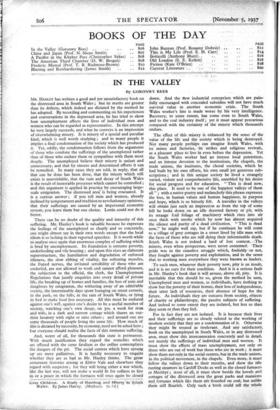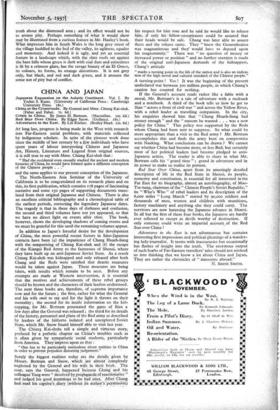BOOKS OF THE DAY
In the Valley (Goronwy Rees) . .
China and Japan (Prof. N. Skene Smith) .. A Pacifist in the Khyber Pass (Christopher Sykes) The American Third Chamber (D. W. Brogan) Frederic Mistral (Prof. T. B. Rudmose-Brown) Blasting and Bombardiering (James Smith) . .
PAGE
806 8a7 .. ,8o8 .. 8o8 810 . . John . Bunyan (Prof. Bonamy Dobree) . .
This is My. Life (Prof. E. H. Carr) Boiticelli (Anthony Blunt). . : . Old London (E. E. Kellett) ..- Fiction (Kate O'Brien) .. Current Literature
• • • • • • • • • •
PAGE
812 81.4 816 816 grit 82o
IN THE VALLEY
By GORONWY REES
MR. HANLEY has written a good and yet unsatisfactory book on the distressed area in South Wales ; but its merits are greater than its defects, which indeed are dictated by the method he has adopted. By recording and commenting on his experiences and conversations in the depressed area, he has tried to show how unemployment affects the lives of individual men and women who can be regarded as representative. In this attempt he very largely succeeds, and what he conveys is an impression of overwhelming misery. It is misery of a special and peculiar he very largely succeeds, and what he conveys is an impression of overwhelming misery. It is misery of a special and peculiar kind, which is well worth studying ; and to many people it implies a final condemnation of the society which has produced it. Yet, oddly, the condemnation follows from the arguments of those who condone the sufferings of the unemployed rather than of those who endure them or sympathise with them most deeply. The unemployed believe their misery is unjust and unnecessary, and that by sincere and determined efforts it can be remedied. In many cases they are told, in reply, that all that can be done has been done, that the misery which still exists is unavoidable, that the ruin and decay of South Wales is the result of inexorable processes which cannot be controlled ; and this argument is applied in practice by encouraging large- scale emigration. The distressed area is being evacuated. It is a curious answer ; if you tell men and women, already inclined by temperament and tradition to revolutionary opinions, that their sufferings are caused by an impersonal economic systern, you leave them but one choice. Lenin could not do it better.
There can be no doubt of the quality and intensity of this suffering. Mr. Hanley's book is valuable because he expresses the feelings of the unemployed so clearly and so concretely, one might almost say in their own words except that the local idiom is so lacking in their reported speeches. It is worth while to analyse once again that enormous complex of suffering which is bred by unemployment. Its foundation is extreme poverty, underfeeding and vile housing ; and upon this rises an elaborate superstructure, the humiliation and degradation of enforced idleness, the slow ebbing of vitality, the softening muscles, the frayed nerves, the irritated sensibility of those who are underfed, are not allowed to work and cannot afford pleasure, the subjection to the official, the clerk, the Unemployment Regulations that justify enquiries into every detail of priVate life, the breaking up of homes and families, the loss of sons and daughters by emigration, the withering away of an nth-nit:able society, the interminable days spent lounging on street corners, in the park, on the hills, in the rain of South Wales, or lying in bed to make food less necessary. All this must be endured against one's will, against one's desire to be a useful member of society, watching one's own decay, on 3os. a week for man and wife, in a dark and narrow cottage which shares an out- do-or lavatory with eight or nine others ; and around one are some thousands of people living the same life. How much Of this is dictated by necessity, by economy, need not be asked here ; but everyone should realise the facts of this immense suffering. And, worst of all, for thousands this state is permanent. With much justification they regard the remedies which are offered with the same fatalism as the collier contemplates the dangers of the pit. The social centres which have sprung up' are mere palliatives. It is hardly necessary to enquire whether they are as bad as Mr. Hanley thinks. The great armament factories arising at Ebbw Vale and elsewhere they regard with_ suspicion ; for they will bring either a war which, like the last war, will not make a world fit for colliers to liye in or a peace in which the furnaces will once again be closed Gray Children. A Study of Humbug and- fvfiseryr-hr Sduth Wales. By James Han'ey. (Methuen. 75. (c15 down. And the flew industrial enterprises which are pain- fully encouraged with concealed subsidies will not have much survival value in another economic crisis. The South Wales worker's fate is made worse by hii very intelligence. Recovery, to some extent, has come even to South Wales, and to the coal industry itself ; yet it must appear precarious compared with the certainty of the misery which thousands endure.
The effect of this misery is enhanced by the sense of the value of the life and the society which is being destroyed. Not many people perhips can ittiagine South Wales, with its mines and factories, -its strikes and religious revivals, as a pleasant place to live in even before the depression. Yet the South Wales worker had an intense local patriotism, and an intense devotion to the institutions, the chapels, the trade unions; the institutes, the choral societies, which he had built by his own efforts, his own small yet generous sub- scriptions ; ' and in this unique society he lived a strangely varied, violent and comprehensive life, ennobled by his desire for Social "progress and for education. " This is dead now, this pike. It used to be one of the happiest valleys of them all " ; with a native poetry and melancholy this phrase expresses the loss, in human values and human happiness, in purpose and hope, which is so bitterly felt. A traveller in the valleys will obtain hist such an impression as from the top of some hill he look down on an idle deserted factory or pit,' with its' strange frail foliage of machinery which rises into air once thick with smoke which by now has almost acquired the silence and purity of a' dead civilisation. " This is' dead now," he might well say, but if he continues he will con* to a village of grey cottages in a street lined by idle men with the faces of those who are still dying' their interminable death, Sduth Wales is not indeed a land of lost content. The miners, even when prosperous, were never 'contented: , Their pride was in the ceaseless struggle which; foolishly:or, not they fought against poverty and exploitation, and 'in the sense that to working men everywhere they were known as leaders.
To such men, whatever their poverty now, pity is an insult, and it is no cure for their condition. Arid it is a serious fault in Mr. Hanley's book that it will arouse, above all, pity. It is inevitable that this should be so, given the method he uses, Unemployed men and women, as individuals, have nothing to show but the poverty of their homes, their loss of independence, their utter lack of resources, their absence of hope for the future. As individuals they are outcasts from society, objects of charity or philanthropy, the passive subjects of suffering. And indeed to some extent they are isolated, but less so than they seem or than they feel.
For in fact they are not isolated. It is because their lives and their sufferings are so closely related to the working of modern society that they are a condemnation of it. Otherwise they might be treated as irrelevant. _ And any satisfactory.
book on the unemployed in South Wales, or in any distressed area, must show this interconnexion concretely and in detail, not merely the sufferings of individual men and women. It must show the effects of mass unemployment, not only on those who are out of work but those who are in, work ; it must show them not only in the social centres, but in the trade unions, in the political movement, in the chapels. Even more, it must follow the valleys down to their mouths, and show the idle rusting steamers in Cardiff Docks as well as the closed furnaces at Merthyr ; most of all, it must show beside the hovels and cottages 'of the distressed area the great parks and mansions and fortunes which like them are founded on coal, but unlike them still flourish. Only such a book could tell the whole truth about the distressed area ; and . its effect would not be to arouse pity. Perhaps something of _ what it would show may be illustrated from a curious feature in Mr. Hanky's book. What impresses him in South Wales is the long grey street of the village huddled in the bed of the valley, its ugliness, squalor and monotony. And indeed it is ugly, and yet an essential feature in a landscape which, with the ..slate roofs set. againit the bare hills whose green is dark with coal dust and sometimes is lit by a crimson glare, has the savage beauty of in El Greco, its colours, its forms, its strange distortions. It is not grey only, but black, and red and dark green, and it arouses the sense not of pity but of conflict.















































 Previous page
Previous page